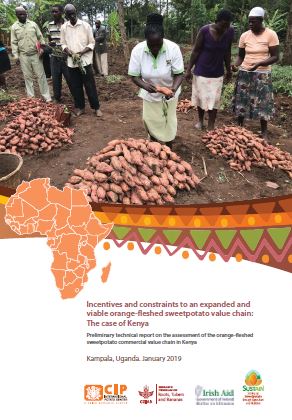In order to systematically document and analyze the experiences of working with various partners on the assessment of the orangefleshed sweetpotato commercial value chain in Kenya, SUSTAIN project conducted a systematic study focusing on various value chain actors. The overall research question addressed by the study was: What factors determine the early interest and uptake of OFSP processing by commercial partners in the urban food sector, and how can incentives be created for private sector (co‐)investments at different stages of program implementation? The study focused on the following specific research questions: i. How has the OFSP value chain developed – 2014 to date? ii. What have been the outcomes and why: That is, what have been opportunities (incentives) and challenges (constraints)? iii. How were the challenges resolved and opportunities exploited? In addressing the last question, the study examined the institutional innovations that were used to overcome the constraints and how they lay the foundations for a viable and sustainable value chain.
Incentives and constraints to an expanded and viable orange‐fleshed sweetpotato value chain: The case of Kenya.
Citation: Okello, J.J. 2019. Incentives and constraints to an expanded and viable orange‐fleshed sweetpotato value chain: The case of Kenya. Scaling up Sweetpotato through Agriculture and Nutrition Project (SUSTAIN). International Potato Center. 38 p.
2019-01-31
IMPACT ASSESSMENT, , SWEETPOTATO AGRI-FOOD SYSTEMS, SWEETPOTATOES
Africa, Eastern Africa
Kenya
report

